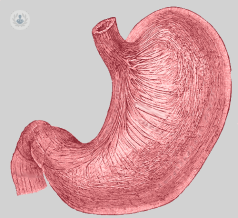

What is stomach surgery?
Stomach surgery describes the group of surgical procedures that remove, repair or modify the stomach, depending on what the underlying illness or problem is. Stomach disorders that can require surgery include:
- Stomach acid disease – a condition in which the stomach overproduces stomach acid, and can lead to stomach ulcers forming.
- Stomach cancer
- Gastroparesis – a condition where the stomach cannot properly empty itself of food due to a damaged vagus nerve which controls the digestive system.
- Stomach dumping – a condition in which food moves too quickly along the small intestine.
- Dysphagia – a condition where patients are unable to swallow food properly.
- Gastric bypass for weight-loss – some patients suffering from obesity will undergo gastric bypass surgery (a type of bariatric surgery) to help them lose weight.

Why would you need stomach surgery?
Surgery is generally required if other means of treatment and lifestyle changes have not worked to cure or overcome a problem. For emergency problems, or later stage stomach cancer, surgery will usually be the best option for treatment.
What does it involve?
The various procedures for treating bad cases of stomach acid disease are:
- Vagotomy – a procedure where the vagus nerve, which stimulates stomach acid production, is cut.
- Pyloroplasty – a procedure that widens the opening in the lower part of the stomach, which allows food to empty into the small intestine more easily.
- Partial gastrectomy – this procedure involves removing a section of the stomach. This may be required when part of the stomach tissue is badly damaged by stomach acid.
Surgery for treating stomach cancer will usually be combined with other treatments, such as chemotherapy or radiation therapy. To treat stomach cancer surgically, usually the stomach will need to be partially or completely removed. Often, nearby lymph nodes will also be removed. When the stomach is completely removed, the oesophagus will be connected directly to the small intestine.
If gastroparesis is severe and nutrients and medications cannot reach the bloodstream, surgery will be recommended. For this condition, a gastrostomy tube might be inserted through the abdominal skin and into the stomach. This should decompress the stomach, and allow feeding through the tube.
To surgically treat stomach (gastric) dumping, the pyloric sphincter muscle can be reconstructed to improve the controlled release of food into the small intestine from the stomach.
Patients suffering from dysphagia may require a tube to be implanted into the stomach to allow the intake of nutrition and hydration. This tube can either be inserted endoscopically through the throat or via an incision made in the abdomen.
Bariatric surgery is a group of procedures that assist in weight-loss for obese patients. Gastric bypass surgery is one of the most common options and involves decreasing the size of the stomach by stapling a section of the stomach together, thereby limiting the amount of food that can enter the stomach. Next, the small intestine is attached to this section of the stomach, meaning food bypasses a section of the digestive system and fewer calories and nutrients are absorbed.
How to prepare for it
Most of these surgical interventions require general anaesthetic and are relatively intensive procedures, each with their own sizeable recovery period. As these surgeries are dealing with the digestive system, a period of fasting will generally be necessary before surgery.
Post-operative care
Many of these stomach surgeries will result in necessary lifestyle changes, including dietary adjustments, portion control, the need to use a feeding tube, and being aware of taking in enough of the right nutrients. Each procedure will have its own set of adjustments to make after surgery with the support of a specialist to assist in these being actioned.
